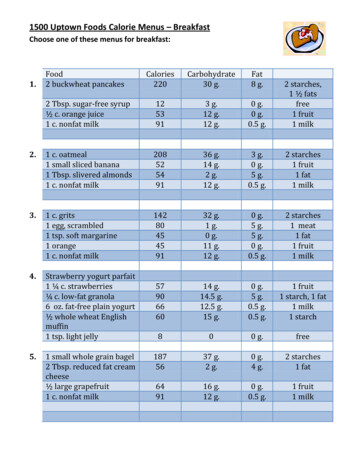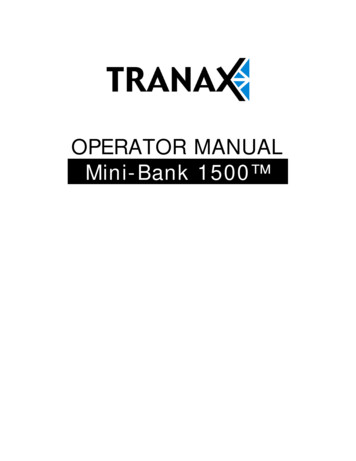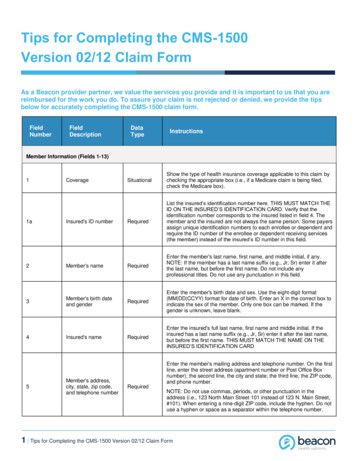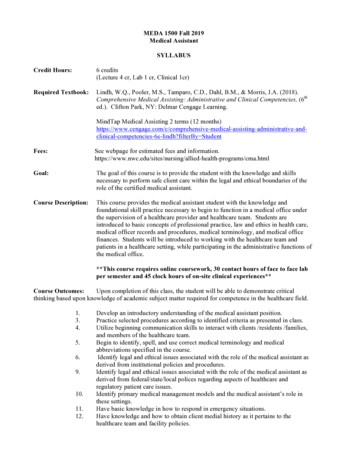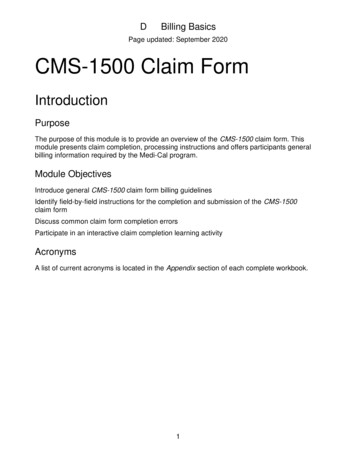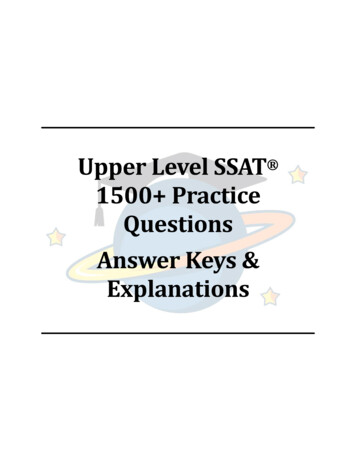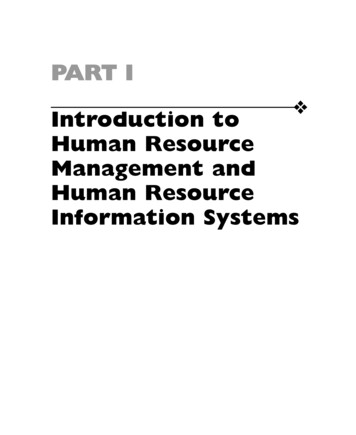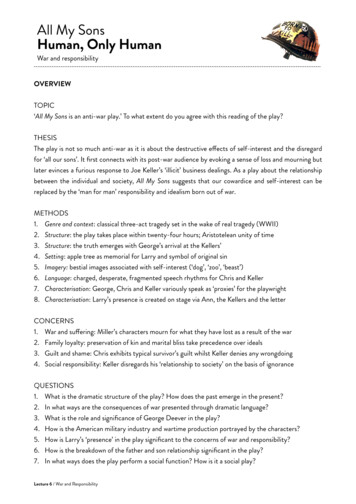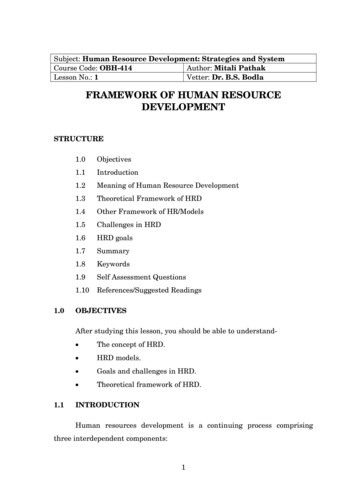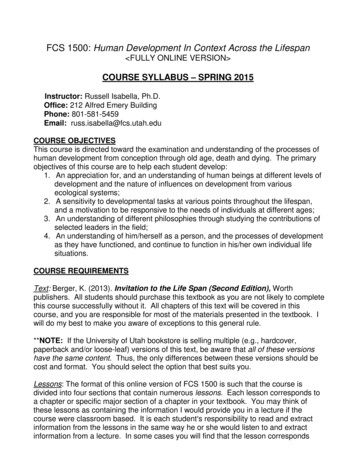
Transcription
FCS 1500: Human Development In Context Across the Lifespan FULLY ONLINE VERSION COURSE SYLLABUS – SPRING 2015Instructor: Russell Isabella, Ph.D.Office: 212 Alfred Emery BuildingPhone: 801-581-5459Email: russ.isabella@fcs.utah.eduCOURSE OBJECTIVESThis course is directed toward the examination and understanding of the processes ofhuman development from conception through old age, death and dying. The primaryobjectives of this course are to help each student develop:1. An appreciation for, and an understanding of human beings at different levels ofdevelopment and the nature of influences on development from variousecological systems;2. A sensitivity to developmental tasks at various points throughout the lifespan,and a motivation to be responsive to the needs of individuals at different ages;3. An understanding of different philosophies through studying the contributions ofselected leaders in the field;4. An understanding of him/herself as a person, and the processes of developmentas they have functioned, and continue to function in his/her own individual lifesituations.COURSE REQUIREMENTSText: Berger, K. (2013). Invitation to the Life Span (Second Edition), Worthpublishers. All students should purchase this textbook as you are not likely to completethis course successfully without it. All chapters of this text will be covered in thiscourse, and you are responsible for most of the materials presented in the textbook. Iwill do my best to make you aware of exceptions to this general rule.**NOTE: If the University of Utah bookstore is selling multiple (e.g., hardcover,paperback and/or loose-leaf) versions of this text, be aware that all of these versionshave the same content. Thus, the only differences between these versions should becost and format. You should select the option that best suits you.Lessons: The format of this online version of FCS 1500 is such that the course isdivided into four sections that contain numerous lessons. Each lesson corresponds toa chapter or specific major section of a chapter in your textbook. You may think ofthese lessons as containing the information I would provide you in a lecture if thecourse were classroom based. It is each student s responsibility to read and extractinformation from the lessons in the same way he or she would listen to and extractinformation from a lecture. In some cases you will find that the lesson corresponds
very closely with the relevant textbook material. Other times, you will see that theinformation presented in the lesson is quite different from that provided by the textbook.In either case, it is expected that you will learn the material presented in the lessons.Note that lessons will be released and thus be available to you one section of thecourse at a time. Each exam (see below) is scheduled for a specific range of datesand covers a specific amount of material. There is no benefit to moving through thelessons more quickly than is necessary for being prepared for each scheduled exam.Also, it is not possible to take the exams earlier than the scheduled date. It is for thesereasons that I am controlling the availability to you of the lessons. Also, please beaware that lessons will not be available to you forever. It is recommended that youdownload and print them. Once an exam has passed, you will no longer have accessto the lessons relevant to that completed exam.Finally, all lesson content is copyrighted material. Any use of these materials beyondwhat is reasonably necessary for completion of this course is prohibited without writtenpermission from the instructor.Exams: Four examinations will be given throughout the semester; each of these willcover materials presented in the text book and lessons. PLEASE NOTE that you willbe responsible for all text book content regardless of whether it has been directlyaddressed in the lessons. (You will be informed of any exceptions to this general rule.)Exams will consist of multiple choice questions only. The first three exams willcontain approximately 50 questions; the final exam will contain approximately 80questions. The first three exams will cover only the materials from the correspondingsections of the course. The final exam will cover the materials corresponding to thefourth section of the course, along with a small number of questions that will becumulative (more on this at a later time). Each exam will be worth 100 points.Reviews for each exam will be provided approximately one week before the scheduledexam time.**All testing will be online, and it is YOUR responsibility to complete each examduring the time it will be available to you to complete. For each of the first threeexams, you will have a 4-day window for completion; there will be a 5-day window forthe final exam (see below for specific dates). Please note, however, that you will onlyhave one opportunity to complete each exam during its four-day availability period(meaning that you cannot take the same exam more than once, and you may access itonly to complete it). Should you fail to complete any of the exams during the respectiveexamination periods, you will receive a 0 (zero) as your score for that exam. Anystudent who misses an exam and requests to complete it beyond the scheduledexamination period may be granted this request at the discretion of the instructor, but infairness to students who abide by the schedule, 20 points will be deducted from earnedscores for any late exams.
Assignments: Each student will be required to complete two written assignments duringthe semester. Four assignments will be offered, and you must decide which two of the fouryou will complete. One must come from the two assignments that will be offered during thefirst half of the course; the other must come from the two assignments that will be offeredduring the second half of the course. In all cases, your written assignments must besubmitted through Canvas. (Additional information will be provided at a later time.)Grading: Grades will be based on the average of your points accumulated across thefour exams and two assignments completed throughout the semester. Generallyspeaking, point accumulations averaging between 93 and 100% will be awarded an A,90-92 an A-, 87-89 a B , 83-86% a B, 80-82 a B-, 77-79 a C , 73-76 a C, 70-72% a C-,67-69% a D , 63-66 a D, 60-62 a D-, and point accumulations below 60% awarded anE. Please be aware that incompletes will not be given.Standard University Policy Issues Relevant to this (and all) Course(s)The following language (or its equivalent) is relatively standard in accordance withUniversity of Utah policy and should appear on all of your course syllabi:Students with Special Needs: The University of Utah seeks to provide equalaccess to its programs, services and activities for people with disabilities. If you willneed accommodations in the class, reasonable prior notice needs to be given to theCenter for Disability Services, 162 Union Building, 581-5020 (V/TDD). CDS will workwith you and the instructor to make arrangements for accommodations.Academic Honesty: All honesty and plagiarism policies established by theUniversity of Utah will be upheld in this class. Academic misconduct includes, but is notlimited to, representing another’s work as your own, collaborating on individualassignments, and submitting the same work for more than one course without thepermission of both instructors. Any of these actions will not be tolerated. If youinclude information from outside the class or quotes in your written assignments (withthe exception of exams), you must provide citations and a reference list. Avoid theurge to over-rely on quotes; a written assignment that is substantially made up ofquoted material will not be considered to be your own work, even if you have usedcorrect citations.If it is discovered that you have engaged in academic misconduct of any type inthis course, the Family & Consumer Studies departmental policy states that youwill be given a failing grade in the course and be reported to the Dean and the VPfor Academic Affairs, who will keep your name on record. Should you be reported morethan once, you may face expulsion from the University.For further information about the University of Utah’s policies regardingacademic misconduct, please refer to the online “Code of Student Rights andResponsibilities:” ml
University Drop and Withdrawal Policies: You may drop this class withoutpenalty or permission until January 21, 2015. You may withdraw from the coursewithout permission from January 21, 2015 to March 6, 2015, but a “W” will be recordedon your academic record, and applicable tuition and fees will be assessed. After March6, 2015, you will not be allowed to withdraw from this course. If you have any questionsregarding this policy, please contact the Office of Admissions and Registrar at (801)581-5808.Note: The syllabus is not a binding, legal contract. It may be modified by theinstructor when the student is given reasonable notice of the modification.In order to maintain a positive, civil environment for learning I expect that all studentswill strive to meet the goals described in the University of Utah’s Student Code, whichstates “the mission of the University of Utah is to educate the individual and todiscover, refine and disseminate knowledge. The University supports the intellectual,personal, social and ethical development of members of the University community.These goals can best be achieved in an open and supportive environment thatencourages reasoned discourse, honesty, and respect for the rights of all individuals.Students at the University of Utah are encouraged to exercise personal responsibilityand self-discipline and engage in the rigors of discovery and scholarship.”Anticipated Course Progression (and recommended pacing of materials)Note that some chapters/lessons contain a good deal more material than others.Recommended times for completion will vary accordingly. Also, there are morelessons than chapters because the lessons aim to organize the material in manageable chunks. Using these guidelines, you should proceed at a pace that works for you.Section I: Introduction, Background, Prenatal Development, Infant Development(Jan 12 – Feb 14) Readings: Chapters 1-4Chapter 1/Lesson 1 -complete by January 17Chapter 1/Lessons 2 and 3 - complete by January 22Chapter 2/Lessons 4 - complete by January 25Chapter 2/Lessons 5 and 6 - complete by January 28Chapter 3/Lesson 7 - complete by February 2Chapter 3/Lesson 8 - complete by February 7Chapter 4/Lesson 9 - complete by February 11 FEB 11-14 (Week 5) EXAM 1Continued
Section II: Early Childhood (Play Years), Middle Childhood (School Years)(Feb 14 – Mar 14) Readings: Chapters 5-8Chapter 5/Lesson 10 - complete by February 18Chapter 5/Lesson 11 - complete by February 22Chapter 6/Lesson 12 - complete by February 27Chapter 7/Lesson 13 - complete by March 3Chapter 7/Lesson 14 - complete by March 7Chapter 8/Lesson 15 - complete by March 11 MAR 11-14 (Week 9)EXAM 2Section III: Adolescence, Emerging Adulthood(Mar 14 – Apr 11) Readings: Chapters 9-11Chapter 9/Lessons 16 and 17 - complete by March 20Chapter 10/Lesson 18 - complete by March 25Chapter 11/Lesson 19 - complete by March 30Chapter 11/Lesson 20 - complete by April 4Chapter 11/Lesson 21 - complete by April 8 APR 8-11 (Week 13)EXAM 3Section IV: Adulthood and Late Adulthood; Death and Dying(Apr 11 – May 4) Readings: Chapters 12-15 and EpilogueChapter 12/Lesson 22 - complete by April 14Chapter 12/Lesson 23 - complete by April 17Chapter 13/Lesson 24 - complete by April 20Chapter 14/Lesson 25 - complete by April 23Chapter 14/Lesson 26 - complete by April 26Chapter 15/Lesson 27 - complete by April 29Epilogue/Lesson 28 - complete by Final Exam APR 30 – MAY 4 (Week 16/17)EXAM 4 (1/4 of final will be comprehensive)
FCS 1500: Human Development In Context Across the Lifespan FULLY ONLINE VERSION COURSE SYLLABUS – SPRING 2015 Instructor: Russell Isabella, Ph.D. Office: 212 Alfred Emery Building Phone: 801-581-5459 Email: russ.isabella@fcs.utah.edu COURSE OBJECTIVES This course is directed tow
